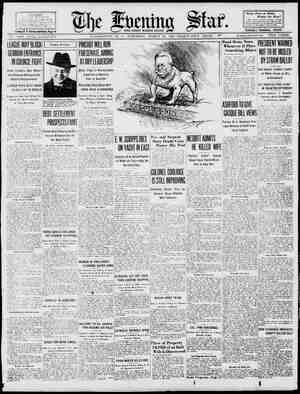The Daily Worker Newspaper, March 13, 1926, Page 7
You have reached the hourly page view limit. Unlock higher limit to our entire archive!
Subscribers enjoy higher page view limit, downloads, and exclusive features.
Second Section: SATURDAY, MARCH 13, 1926 No, this is not a scene from the Paris Commune! Fred Ellis, a scene from the every-day life of the striking textile workers of Passaic, New Jersey, United States of America. One of the horrible weapons of the World War is being used against the workers—TEAR BOMBS are bei Some of the pickets, veterans of the bosses’ police on the streets of New Jersey’s towns! GAS MASKS to protect themselves from the poisonous fumes. Supine + THE DAILY WORKER This Magazine Section Appears Every Saturday in The DAILY WORKER. the talented cartoonist of The DAILY WORKER, shows here ng thrown at the strikers by the “War for Democracy,” have put on This is an omen of the future. Lessons of the Paris Commune By MANUEL GOMEZ. L ON the eighteenth of March of every year, regular as clock- work, the social-democratic parties of the Second Interna- tional remembered the Paris Commune—much as they might re- member a flood, or a festival, or the birthday of one of their leaders. Anniversary mass meetings were held thruout Europe, at which the speaker of the evening repeated the story, especially re-learned for the occasion, of the seizure of the cannon on the heights of Montmartre, the ringing of the church bells, the spon- taneous outpouring of the National Guard, the violent death of Thomas and Lecomte, the election of the Commune, the delayed sortie against the Versaillese, the activity of Thiers’ spies, the stealthy entry of his troops into the undefended southwest end of Paris, the barricades, and the terrible butchery at the mur des federes—the “same old story,” as it came to be known. With few exceptions, the social-democratic leaders made no serious attempt to analyze the Commune in its relation to the develop- ment of the class struggle. They were, in fact, bewildered and embarrassed by the great proletarian tradition of 1871, which did not seem to have a place in their world of parliamentarism; they limited themselves to contrasting the ferocity of the Thiers reaction with the “‘generosity” and leniency of the Communards. The one lesson they drew was that the principle of “democ- racy” had been vindicated in the elections to the Commune, held March 26. Only the anarchists kept alive in some measure the spirit of the Commune, tho of course, they followed Kropotkin in presenting it merely as a step toward the creation of an auto- nomous system of “free communes.” In the United States it is not too much. to say that the Commune was ignored exeept for the purpose of tableau and theatrical entertainment. Some- times the Socialist Party was too busy even to remember the date. “Marx, however,” as Lenin pointed out in his work on The State and Revolution, “was not only enthusiastic about the heroism of the Communards-—‘storming heaven’ as he said. In the mass revolutionary movement, altho it did not attain its ob- jective, he saw a historic experiment of gigantic importance, a certain advance of the world proletarian revolution, a practical step more important than hundreds of programs and discus- sions. To analyze this experiment, to draw its lessons in tac- tics, to ré-examine his theory in the new light it afforded—sach was the problem as it presented itself to Marx.” Immediately upon the fall of the Commune Marx presented his Address of the General Council of the International Work- ingmen’s Association, now known as The Civil. War in France, which is not only a passionate defense of the Commune, but an analysis of its historical significance, its accomplishments and the mistakes that were responsible for its final defeat. Lenin calls attention to the important fact that the only “correction” which Marx thought it necessary to make in the Communist Manifesto was made on the basis of the revolutionary experi- ence of the Paris Communards. : “The last preface to a new German edition of the Com- munist Manifesto signed by both its authors,” Lenin reminds us, “is dated June 24, 1872. In this preface the authors, Karl Marx and Friedrich Engels say that the program of the Commu- nist Manifesto is now “in some places out of date.” : “Especially,” they continue, ‘did the Commune demonstrate that the ‘working class cannot simply seize the available ready machinery of the state and set it going for its own ends.’” The Paris Commune of 1871 was the first attempt of the workers to break up the bourgeois state and to transform exist- ing society. Despite the element of vague republican sentiment- alism, it was essentially proletarian. At the very beginning, on March 20, the Journal Officiel declared: “The proletarians of the capital, in the midst of the failure and treason of the governing classes, have realized that the hour has arrived for them to save the situation by taking over the direction of public affairs. The proletariat, in the face of (Continued on next page—page 2)




